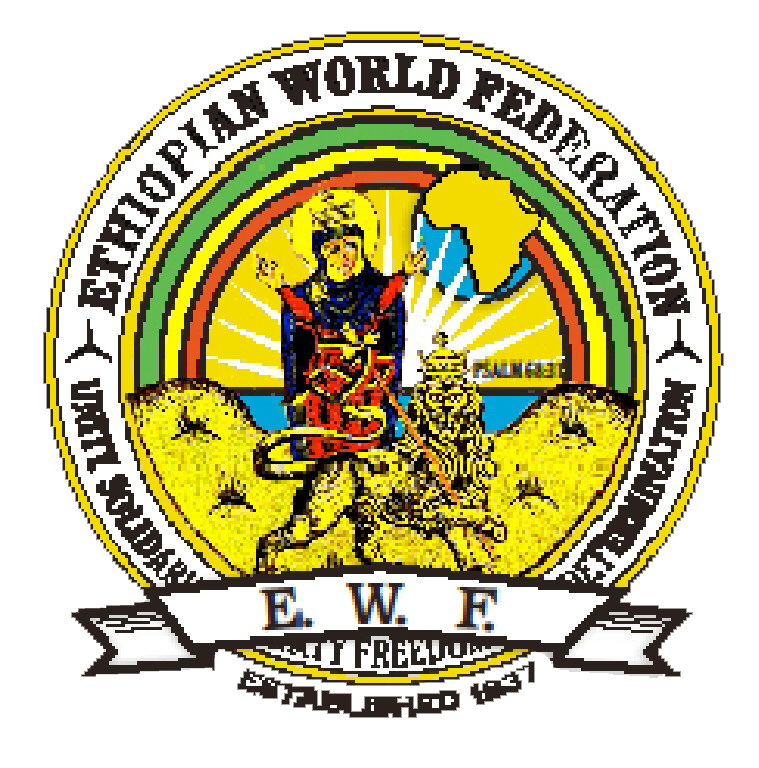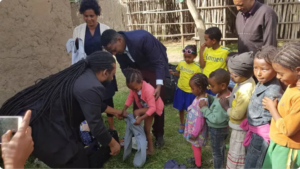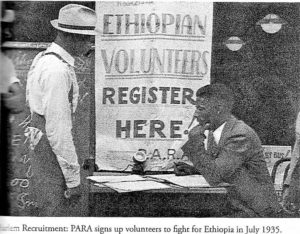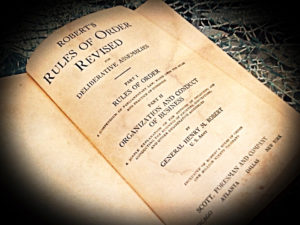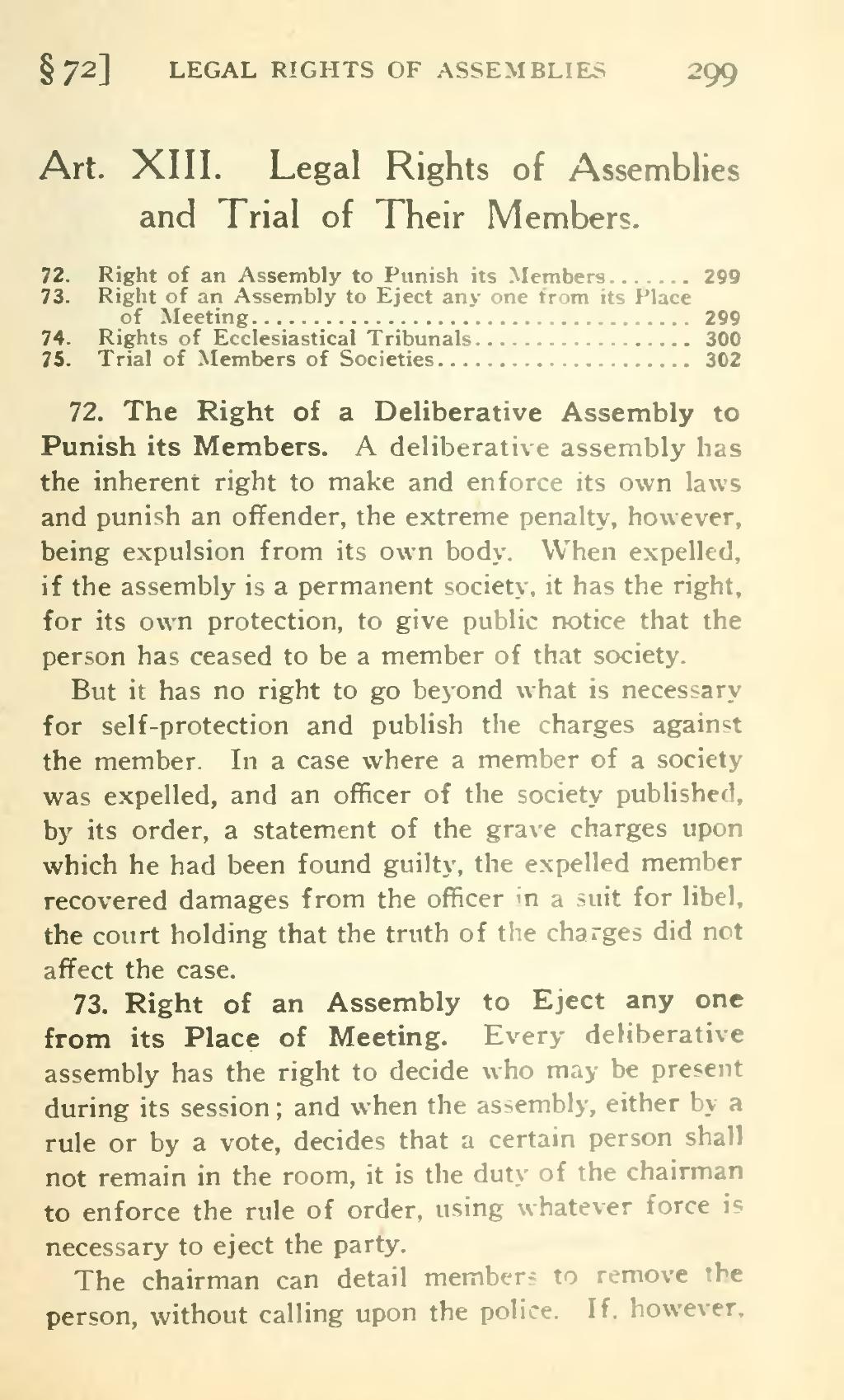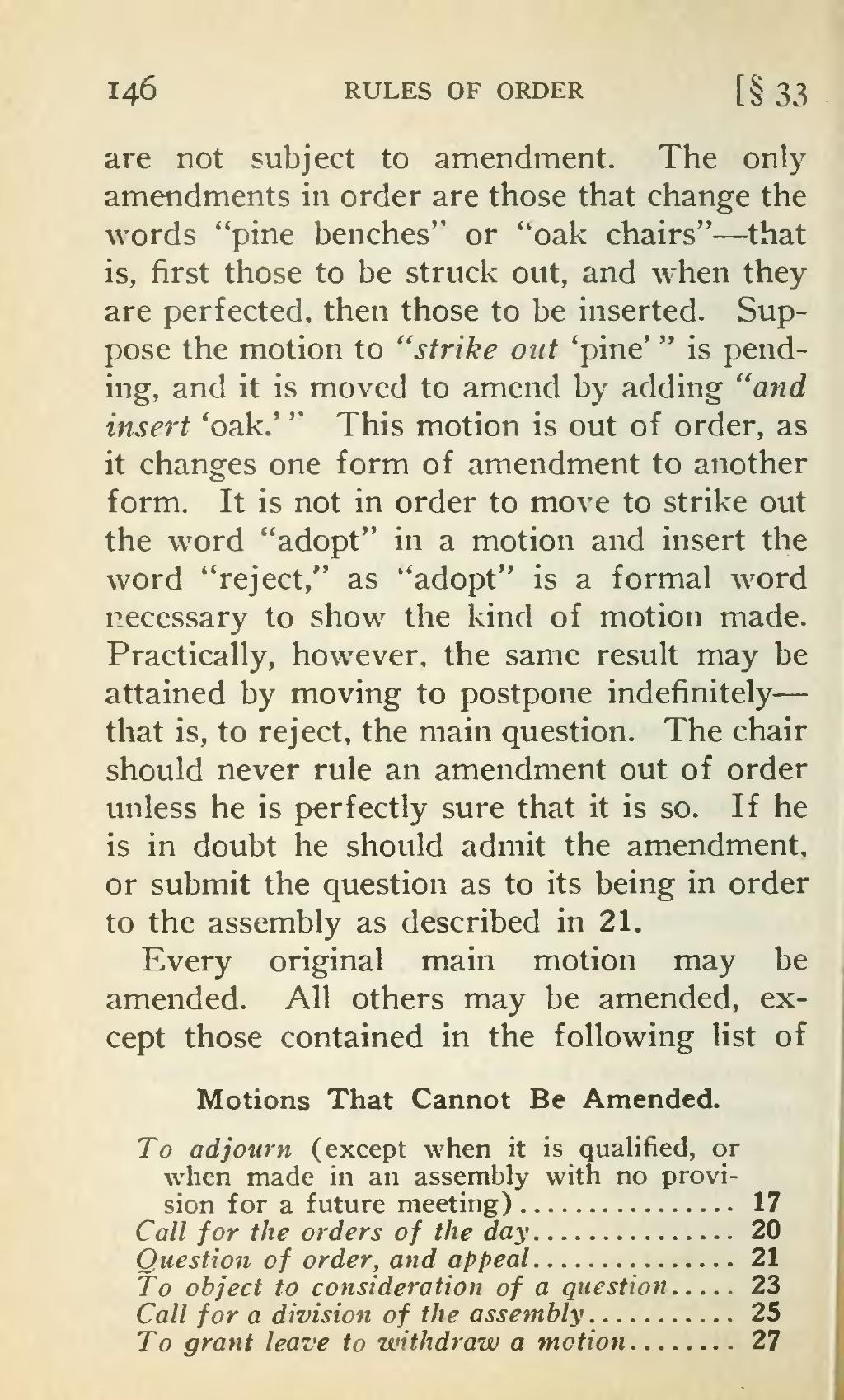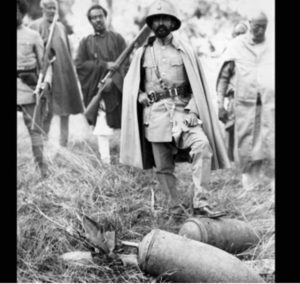 Malaku Bayen (April 29th, 1900-May 4th, 1940) was born in Wollo Province in central Ethiopia. At six months of age, he was taken by his parents to the city of Harar, where he grew up in the palace of Ras (Grand Duke) Tafari Makonnen, his mother’s first cousin and the future Emperor of Ethiopia (Haile Selassie I). In accordance with the aristocracy’s custom of educating and training likely young boys for positions of leadership, young Malaku was placed under the tutelage of his prominent and powerful relative and taught by priests, attached to Ras Tafari’s palace. During these years, Malaku lived close to the future king, serving as both his page and personal attendant. In 1921, when Tafari was selecting young Ethiopian men and women to be educated abroad, Malaku was among the first to be chosen. Malaku says, “I was told of my responsibility by His Majesty himself; that I was to study medicine and return to Ethiopia as a physician for the purpose of helping to organise the Public Health System”. Bayen was subsequently sent to Bombay, India with three colleagues, two young men and a woman, for preparatory studies under private tutors from Great Britain. Cast in the typical imperialistic mould of Victorian England, these Instructors used to tell us, Bayen later recalled, “of the greatness of the British Empire.” Finally, when his teachers haughtily informed him and his comrades that it was British destiny one day to control Ethiopia, Bayen decided that he had had enough of an English education. After discussing the matter, he and his friends concluded that, America was the only country that would never try to rob us of our country therefore, it would be best to go there. The tiny group thereupon prevailed upon their benefactor, Ras Tafari, to permit them to pursue their studies in the United States, where imperialistic designs on Africa seemed absent. Much to their probable relief and delight, the students’ request was granted. Thus, within the short span of one year they were preparing to travel to yet another far off land.
Bayen set sail with two of his colleagues for the United States. (The young woman had died in India.) The three students arrived in America in April 1922, carrying with them a personal letter of introduction to President Warren G. Harding from Ras Tafari, by now heir apparent to the Ethiopian throne. Because of their impressive credentials from the Ethiopian regent, the trio was permitted to meet Mr. Harding, who urged the Africans to enroll at Muskingum College. The Ethiopians accepted the President’s kindly suggestion. Bayen zealously studied his lessons at Muskingum Academy and by attending classes during the regular school year and summers he was able to complete his high school education in 1925. He graduated from that Muskingum College just three years later, becoming one of the first Ethiopian nationals to earn an American degree. The autumn of 1928 he applied and was admitted to the Medical School at Howard University, one of the nation’s most prestigious black educational institutions. Bayen wrote in 1939, “I select Howard University for my studies, in order that I might have a closer contact with my people.” In fact, he continued, “it was this idea that helped me to break my engagement to the daughter of our Minister of Foreign Affairs and to be married to an American girl (Dorothy Hadley) of the Black Race, in 1931.”
The source of Bayen’s identification with Afro Americans is not entirely clear, but his convictions may have been partially shaped by his close relationship with Dr. Azaj Workneh Martin, the Ethiopian Emissary in London, a leading Ethiopian physician and staunch advocate of Pan-African-ism. As early as 1927, Dr. Martin had advised Bayen that, “The greatest service you could render your country would be to influence thousands of Black people in the U.S.A. and the West Indies and let them come and help us develop Ethiopia.” In 1930, Bayen took Trinidadian-born Hubert F. Julian, the Harlem aviator, to Ethiopia. A year later he arranged to have Dr. John West, a physician from Washington, D.C., sent to his country to serve there as a public health official. In 1932, Bayen was instrumental in obtaining a position in the Ethiopian school system for Cyril Price, and in 1934 he played a prominent role in assisting John C. Robinson of Chicago to be appointed as an instructor in aviation.
Malaku Bayen (April 29th, 1900-May 4th, 1940) was born in Wollo Province in central Ethiopia. At six months of age, he was taken by his parents to the city of Harar, where he grew up in the palace of Ras (Grand Duke) Tafari Makonnen, his mother’s first cousin and the future Emperor of Ethiopia (Haile Selassie I). In accordance with the aristocracy’s custom of educating and training likely young boys for positions of leadership, young Malaku was placed under the tutelage of his prominent and powerful relative and taught by priests, attached to Ras Tafari’s palace. During these years, Malaku lived close to the future king, serving as both his page and personal attendant. In 1921, when Tafari was selecting young Ethiopian men and women to be educated abroad, Malaku was among the first to be chosen. Malaku says, “I was told of my responsibility by His Majesty himself; that I was to study medicine and return to Ethiopia as a physician for the purpose of helping to organise the Public Health System”. Bayen was subsequently sent to Bombay, India with three colleagues, two young men and a woman, for preparatory studies under private tutors from Great Britain. Cast in the typical imperialistic mould of Victorian England, these Instructors used to tell us, Bayen later recalled, “of the greatness of the British Empire.” Finally, when his teachers haughtily informed him and his comrades that it was British destiny one day to control Ethiopia, Bayen decided that he had had enough of an English education. After discussing the matter, he and his friends concluded that, America was the only country that would never try to rob us of our country therefore, it would be best to go there. The tiny group thereupon prevailed upon their benefactor, Ras Tafari, to permit them to pursue their studies in the United States, where imperialistic designs on Africa seemed absent. Much to their probable relief and delight, the students’ request was granted. Thus, within the short span of one year they were preparing to travel to yet another far off land.
Bayen set sail with two of his colleagues for the United States. (The young woman had died in India.) The three students arrived in America in April 1922, carrying with them a personal letter of introduction to President Warren G. Harding from Ras Tafari, by now heir apparent to the Ethiopian throne. Because of their impressive credentials from the Ethiopian regent, the trio was permitted to meet Mr. Harding, who urged the Africans to enroll at Muskingum College. The Ethiopians accepted the President’s kindly suggestion. Bayen zealously studied his lessons at Muskingum Academy and by attending classes during the regular school year and summers he was able to complete his high school education in 1925. He graduated from that Muskingum College just three years later, becoming one of the first Ethiopian nationals to earn an American degree. The autumn of 1928 he applied and was admitted to the Medical School at Howard University, one of the nation’s most prestigious black educational institutions. Bayen wrote in 1939, “I select Howard University for my studies, in order that I might have a closer contact with my people.” In fact, he continued, “it was this idea that helped me to break my engagement to the daughter of our Minister of Foreign Affairs and to be married to an American girl (Dorothy Hadley) of the Black Race, in 1931.”
The source of Bayen’s identification with Afro Americans is not entirely clear, but his convictions may have been partially shaped by his close relationship with Dr. Azaj Workneh Martin, the Ethiopian Emissary in London, a leading Ethiopian physician and staunch advocate of Pan-African-ism. As early as 1927, Dr. Martin had advised Bayen that, “The greatest service you could render your country would be to influence thousands of Black people in the U.S.A. and the West Indies and let them come and help us develop Ethiopia.” In 1930, Bayen took Trinidadian-born Hubert F. Julian, the Harlem aviator, to Ethiopia. A year later he arranged to have Dr. John West, a physician from Washington, D.C., sent to his country to serve there as a public health official. In 1932, Bayen was instrumental in obtaining a position in the Ethiopian school system for Cyril Price, and in 1934 he played a prominent role in assisting John C. Robinson of Chicago to be appointed as an instructor in aviation.
 Although many thousands of African Americans had signed up to fight for Ethiopia, only Robinson was able to evade the sanction against Americans fighting against a non-enemy of the US, by securing a business visa to sell airplanes. While in Ethiopia Robinson was recruited by the Emperor to lead his Royal Air Force in 1934 against the imminent fascist attack by Benito Mussolini, Col. Robinson, nick-named the “Brown Condor” stood up when the entire world failed to take action. He valiantly flew dangerous missions to transport men, supplies and the Emperor himself in the face of fierce resistance from Italian fighter pilots. He was eye-witness to the numerous horrendous gas bombings carried out by the Italians on innocent civilians. Constantly chased by the Italian war planes, he often managed to escape into the clouds where Italian pilots were afraid they may run into one of the many tall mountains in Ethiopia. Robinson took enemy fire often and was injured but was never shot down. When Italy’s overwhelming modern forces took Ethiopia’s capital Addis Ababa, Robinson continued his fight in the US spreading the word about the atrocities committed by Italy against Ethiopia. Robinson would later return to Ethiopia after the war to head the rebuilding of the Imperial Ethiopian Air Force and future commercial airlines. He would also later establish the successful American Institute school for elementary and secondary students in Addis Ababa.
Although many thousands of African Americans had signed up to fight for Ethiopia, only Robinson was able to evade the sanction against Americans fighting against a non-enemy of the US, by securing a business visa to sell airplanes. While in Ethiopia Robinson was recruited by the Emperor to lead his Royal Air Force in 1934 against the imminent fascist attack by Benito Mussolini, Col. Robinson, nick-named the “Brown Condor” stood up when the entire world failed to take action. He valiantly flew dangerous missions to transport men, supplies and the Emperor himself in the face of fierce resistance from Italian fighter pilots. He was eye-witness to the numerous horrendous gas bombings carried out by the Italians on innocent civilians. Constantly chased by the Italian war planes, he often managed to escape into the clouds where Italian pilots were afraid they may run into one of the many tall mountains in Ethiopia. Robinson took enemy fire often and was injured but was never shot down. When Italy’s overwhelming modern forces took Ethiopia’s capital Addis Ababa, Robinson continued his fight in the US spreading the word about the atrocities committed by Italy against Ethiopia. Robinson would later return to Ethiopia after the war to head the rebuilding of the Imperial Ethiopian Air Force and future commercial airlines. He would also later establish the successful American Institute school for elementary and secondary students in Addis Ababa.
 Bayen passed his examinations at Howard University and graduated from its medical school in June 1935. Originally, Dr. Bayen had intended to remain in the United States to complete his internship, but the serious situation in Ethiopia caused the Emperor to recall him. Thus, on July 10, 1935, the physician departed for Ethiopia with his wife, Dorothy, and young son, Malaku, Jnr. Dr. Bayen’s duties at the American Mission Hospital in the capital and later with the Ethiopian Red Cross in the Ogaden, brought him into intimate contact with the war.Among those who left Addis Ababa with the monarch were Malaku Bayen and his family; they were ultimately to accompany Haile Selassie to England, where the Emperor was to seek support for a campaign to dislodge the Italians from Ethiopia. In London, Dr. Bayen served as the exiled sovereign’s personal physician, interpreter, secretary, and in other capacities demanded by those trying times. The British capital was home for the Bayen’s, however, for only a brief period. In September 1936 their stay in London was interrupted by the doctor’s selection as Haile Selassie’s special representative to the United States.. Besides, the Emperor now seemed relatively safe at his secluded English residence at Fairfield House in Bath. Thus, it was with no great apprehension that the Bayen’s left London on September 12, 1936, for the United States.
As the special emissary to America of Haile Selassie; Dr. Bayen and his family arrived in New York on September 23, 1936, setting up residence at 1260 Columbia Road, northwest, Washington DC. Dr. Bayen wasted no time in establishing contact with New York’s Afro- American community. On September 28, 1936, just five days after his return to the United States, the physician addressed a gathering of two thousand at Harlem’s Rockland Palace, a popular meeting place, then as well as now, for black nationalists. In a rousing speech, the Ethiopian delegate informed the crowd that his country was not conquered and never would be. Declaring that, “We will never give up,” Dr. Bayen told the audience that, “our soldiers will never cease fighting until the enemy is driven from our soil.” The gathering went “wild with joy” and, according to the doctor, many of those present proceeded to work with him in the interest of Ethiopia.
Dr. Bayen had been working in conjunction with the United Aid for Ethiopia, which was the most active of the few remaining Ethiopian aid associations. During much of this period and even prior to Dr. Bayen’s involvement, the organization, under the leadership of Reverend William Imes, seems to have been performing well. In fact, one glowing report maintained that it had “functioned perfectly well for a while”. The situation began to change, however as members of the American Communist Party took sharp interest in the United Aid and attempted to transform it into a Communist front. Wanting to be free of any entanglement with the ‘Reds,’ communists whether black or white, Dr. Beyen and others decided to form an entirely new organization to be known as the Ethiopian World Federation. Consequently, the United Aid was dissolved, a number of similar groups were combined, and a new more substantial organization with Dr. Beyen as its executive head was formally created on August 25, 1937. Dr. Lorenzo H. King, pastor of St. Mark’s Methodist Church in Harlem, was elected the Federation’s first president. Concerning itself mainly with aiding the thousands of Ethiopian refugees living in Egypt, French Somali land, Kenya, Sudan, and elsewhere, but possessing broader political objectives than its predecessor, the Ethiopian World Federation became a national organization.
In America the soil was rich and the climate good. The seeds sown by Malaku Bayen would in time bring rich rewards. The tentacles of the organization would in the future stretch worldwide and its legacy would provide the fruits of unity solidarity, and self-determination. In the course of time it would be used as a tool to free the conscience of many, who wished to determine their own destiny and future, in the fight against the ills of poverty and discrimination. Assisted in its recruiting efforts by its weekly tabloid, the ‘Voice of Ethiopia’.
The organization conducted propaganda meetings in nearly every American city with a sizable Afro-American population. It also dispatched members to cities less well populated with blacks to establish locals. It was reported in July, 1938 that the Federation had founded ten locals in the United States and had another twenty-two applications pending. By 1940, there were twenty-two actual branches in existence, some of which were located in Latin America and the West Indies; its membership was said to be in the thousands. Considerable funds were raised to help the victims of the war, and to keep open Ethiopian Embassies worldwide. In his autobiography Haile Selassie says “We cannot afford passing without mentioning the substantial support and political agitation which millions of Americans particularly Black Americans, have made. There was a big organization the ‘Ethiopian World Federation’ founded to help Ethiopia. The organization established a newspaper ‘The Voice of Ethiopia’ and granted us substantial support.” Sadly, in May 1940 the organization lost its founder. Ever since August 1939 when he suffered a nervous breakdown attributed to overwork, Dr. Beyen had been ill but his condition had improved somewhat after August, and he returned to his work with the Federation. But his health broke down again, and in March 1940 Dr. Bayen left New York City for treatment at Rockland State Hospital, an up-state sanatorium. Notwithstanding the strenuous efforts of the hospital’s staff, Dr. Bayen developed lobar pneumonia, and died on May 4, 1940, almost four years to the very day of the Italian entrance into Addis Ababa and one year prior to Haile Selassie’s triumphant return to the Ethiopian capital.
Of Dr Bayen Haile Selassie in his Autobiography wrote “In the month of May 1940, we heard of the death, in America, of our loyal servant Dr. Malaku Beyen. When we were told of his death, we mourned him at our residence at Bath. Dr Beyan was our palace servant whom we raised up from childhood. Realizing his diligence and farsightedness, we sent him to be educated in America in 1921, and hardworking as he was, he became a medical doctor. When the Italians invaded Ethiopia, he came to serve his country and his Emperor, and marched to Maychew with us. He had a strong desire to help wounded soldiers and we have heard about the service he rendered operating on them. Dr. Malaku Beyen came to England with us after the war. Them he proceeded to America, where he worked hard to help Ethiopia in any way possible. He did a commendable job of mobilizing and organizing African Americans in supporting Ethiopia’s cause”.
Just as Dr Beyen had succeeded in sustaining interest among black Americans in the plight of Ethiopia, in effect creating a greater understanding between some of his countrymen and Afro-Americans, his life was brought to an abrupt end. With one swift stroke sudden death had not only dispossessed a young woman and her son, of a husband and father but had also as the Voice of Ethiopia eulogized, deprived Ethiopians and Afro- Americans of “one of the most useful and promising of the young leaders of the race.”
Bayen passed his examinations at Howard University and graduated from its medical school in June 1935. Originally, Dr. Bayen had intended to remain in the United States to complete his internship, but the serious situation in Ethiopia caused the Emperor to recall him. Thus, on July 10, 1935, the physician departed for Ethiopia with his wife, Dorothy, and young son, Malaku, Jnr. Dr. Bayen’s duties at the American Mission Hospital in the capital and later with the Ethiopian Red Cross in the Ogaden, brought him into intimate contact with the war.Among those who left Addis Ababa with the monarch were Malaku Bayen and his family; they were ultimately to accompany Haile Selassie to England, where the Emperor was to seek support for a campaign to dislodge the Italians from Ethiopia. In London, Dr. Bayen served as the exiled sovereign’s personal physician, interpreter, secretary, and in other capacities demanded by those trying times. The British capital was home for the Bayen’s, however, for only a brief period. In September 1936 their stay in London was interrupted by the doctor’s selection as Haile Selassie’s special representative to the United States.. Besides, the Emperor now seemed relatively safe at his secluded English residence at Fairfield House in Bath. Thus, it was with no great apprehension that the Bayen’s left London on September 12, 1936, for the United States.
As the special emissary to America of Haile Selassie; Dr. Bayen and his family arrived in New York on September 23, 1936, setting up residence at 1260 Columbia Road, northwest, Washington DC. Dr. Bayen wasted no time in establishing contact with New York’s Afro- American community. On September 28, 1936, just five days after his return to the United States, the physician addressed a gathering of two thousand at Harlem’s Rockland Palace, a popular meeting place, then as well as now, for black nationalists. In a rousing speech, the Ethiopian delegate informed the crowd that his country was not conquered and never would be. Declaring that, “We will never give up,” Dr. Bayen told the audience that, “our soldiers will never cease fighting until the enemy is driven from our soil.” The gathering went “wild with joy” and, according to the doctor, many of those present proceeded to work with him in the interest of Ethiopia.
Dr. Bayen had been working in conjunction with the United Aid for Ethiopia, which was the most active of the few remaining Ethiopian aid associations. During much of this period and even prior to Dr. Bayen’s involvement, the organization, under the leadership of Reverend William Imes, seems to have been performing well. In fact, one glowing report maintained that it had “functioned perfectly well for a while”. The situation began to change, however as members of the American Communist Party took sharp interest in the United Aid and attempted to transform it into a Communist front. Wanting to be free of any entanglement with the ‘Reds,’ communists whether black or white, Dr. Beyen and others decided to form an entirely new organization to be known as the Ethiopian World Federation. Consequently, the United Aid was dissolved, a number of similar groups were combined, and a new more substantial organization with Dr. Beyen as its executive head was formally created on August 25, 1937. Dr. Lorenzo H. King, pastor of St. Mark’s Methodist Church in Harlem, was elected the Federation’s first president. Concerning itself mainly with aiding the thousands of Ethiopian refugees living in Egypt, French Somali land, Kenya, Sudan, and elsewhere, but possessing broader political objectives than its predecessor, the Ethiopian World Federation became a national organization.
In America the soil was rich and the climate good. The seeds sown by Malaku Bayen would in time bring rich rewards. The tentacles of the organization would in the future stretch worldwide and its legacy would provide the fruits of unity solidarity, and self-determination. In the course of time it would be used as a tool to free the conscience of many, who wished to determine their own destiny and future, in the fight against the ills of poverty and discrimination. Assisted in its recruiting efforts by its weekly tabloid, the ‘Voice of Ethiopia’.
The organization conducted propaganda meetings in nearly every American city with a sizable Afro-American population. It also dispatched members to cities less well populated with blacks to establish locals. It was reported in July, 1938 that the Federation had founded ten locals in the United States and had another twenty-two applications pending. By 1940, there were twenty-two actual branches in existence, some of which were located in Latin America and the West Indies; its membership was said to be in the thousands. Considerable funds were raised to help the victims of the war, and to keep open Ethiopian Embassies worldwide. In his autobiography Haile Selassie says “We cannot afford passing without mentioning the substantial support and political agitation which millions of Americans particularly Black Americans, have made. There was a big organization the ‘Ethiopian World Federation’ founded to help Ethiopia. The organization established a newspaper ‘The Voice of Ethiopia’ and granted us substantial support.” Sadly, in May 1940 the organization lost its founder. Ever since August 1939 when he suffered a nervous breakdown attributed to overwork, Dr. Beyen had been ill but his condition had improved somewhat after August, and he returned to his work with the Federation. But his health broke down again, and in March 1940 Dr. Bayen left New York City for treatment at Rockland State Hospital, an up-state sanatorium. Notwithstanding the strenuous efforts of the hospital’s staff, Dr. Bayen developed lobar pneumonia, and died on May 4, 1940, almost four years to the very day of the Italian entrance into Addis Ababa and one year prior to Haile Selassie’s triumphant return to the Ethiopian capital.
Of Dr Bayen Haile Selassie in his Autobiography wrote “In the month of May 1940, we heard of the death, in America, of our loyal servant Dr. Malaku Beyen. When we were told of his death, we mourned him at our residence at Bath. Dr Beyan was our palace servant whom we raised up from childhood. Realizing his diligence and farsightedness, we sent him to be educated in America in 1921, and hardworking as he was, he became a medical doctor. When the Italians invaded Ethiopia, he came to serve his country and his Emperor, and marched to Maychew with us. He had a strong desire to help wounded soldiers and we have heard about the service he rendered operating on them. Dr. Malaku Beyen came to England with us after the war. Them he proceeded to America, where he worked hard to help Ethiopia in any way possible. He did a commendable job of mobilizing and organizing African Americans in supporting Ethiopia’s cause”.
Just as Dr Beyen had succeeded in sustaining interest among black Americans in the plight of Ethiopia, in effect creating a greater understanding between some of his countrymen and Afro-Americans, his life was brought to an abrupt end. With one swift stroke sudden death had not only dispossessed a young woman and her son, of a husband and father but had also as the Voice of Ethiopia eulogized, deprived Ethiopians and Afro- Americans of “one of the most useful and promising of the young leaders of the race.”
